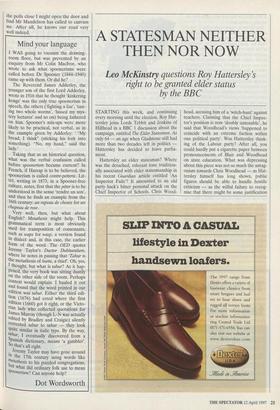Mind your language
I WAS going to vacuum the drawing- room floor, but was prevented by an enquiry from Mr Colin MacIvor, who wrote to ask what spoonerisms were called before Dr Spooner (1844-1940) came up with them. Or did he?
The Reverend James Adderley, the Younger son of the first Lord Adderley, wrote in 1916 that he thought tinkering kongs' was the only true spoonerism in Speech, the others (lighting a liar', 'tast- ing two whole worms', 'hissed my mys- tery lectures' and so on) being fathered on him. Spooner's mix-ups were more likely to be practical, not verbal, as in the example given by Adderley: '"My bread, I think" (sticking his fork into something). "No, my hand," said the lady.'
Taking that as an historical question, what was the verbal confusion called before spoonerism became current? In French, if Harrap is to be believed, the Spoonerism is called contre-peuerie. Lit- tre, writing in 1873, in a Spooner-free culture, notes, first that the peter is to be understood in the sense 'rendre un son', and then he finds an example from the 16th century: un rapeau de choses for un chapeau de rose.
Very well, then, but what about English? Metathesis might help. This grammatical term is most obviously used for transposition of consonants, such as waps for wasp, a version found in dialect and, in this case, the earlier form of the word. The OED quotes Jeremy Taylor's Ductor Dubitantium, Where he notes in passing that `Tahur is the metathesis of hurta, a thief. Oh, yes, I thought, but what is tahur? As it hap- pened, the very book was sitting dustily on the other side of the room. Perhaps Context would explain. I hauled it out and found that the word printed in our edition was tabur. Either the third edi- tion (1676) had erred where the first edition (1660) got it right, or the Victo- rian lady who collected quotations for James Murray (though L—N was actually edited by Bradley and Craigie) silently Corrected tabur to tahur — they look quite similar in italic type. By the way, tahur, I eventually discovered from a SPanish dictionary, means 'a gambler'. So that's all right. Jeremy Taylor may have gone around 11 the 17th century using words like etathesis to his puzzled congregations, but what did ordinary folk use to mean spoonerism? Can anyone help?
Dot Wordsworth


































































 Previous page
Previous page